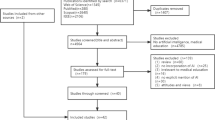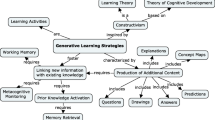Abstract
Although there is consensus among medical educators that students must receive training in the biomedical sciences, little is known regarding the role of biomedical knowledge in diagnosis. The present paper presents two studies examining the role of biomedical knowledge, specifically knowledge of causal mechanisms, in novice diagnosticians. In Experiment 1, two groups of participants are taught to diagnose a series of artificial diseases. In the causal learning condition students learn the underlying causal mechanisms for each feature. A second group learns the same diseases without the causal explanations. Participants are asked to diagnose a series of written cases immediately after training and again 1 week later. The results show that students who learn a causal model are better able to retain their diagnostic performance over time (89% correct vs. 78%). This finding is investigated further in Experiment 2, demonstrating that students rely more on casual information after a delay (mean probability of 57% vs. 43%). Together, the studies suggest that knowledge of underlying causal mechanisms can aid student memory for diagnostic categories and that use of causal knowledge changes over time.
Similar content being viewed by others
References
Ahn, W. K., Kim, N. S., Lassaline, M. E., & Dennis, M. J. (2000). Causal status as a determinant of feature centrality. Cognitive Psychology, 41, 361–416.
de Bruin, A. B., Schmidt, H. G., & Rikers, R. M. (2005). The role of basic science knowledge and clinical knowledge in diagnostic reasoning: A structural equation modeling approach. Academic Medicine, 80, 765–773.
Elstein, A. S., & Schwartz, A. (2000). Clinical reasoning in medicine. In J. Higgs, & M. Jones (Eds.), Clinical reasoning in the health professions. Oxford, UK: Butterworth Heinemann, pp. 95–106.
Joseph, G. M., & Patel, V. L. (1990). Domain knowledge and hypothesis generation in diagnostic reasoning. Medical Decision Making, 10, 31–46.
Kim, N. S., & Ahn, W. K. (2002). Clinical psychologists’ theory-based representations of mental disorders predict their diagnostic reasoning and memory. Journal of Experimental Psychology—General, 131(4):451–476.
Medin, D. L., & Shoben, E. J. (1988). Context and structure in conceptual combination. Cognitive Psychology, 20, 158–190.
Neufeld, V. R., Norman, G. R., Feightner, J. W., & Barrows, H. S. (1981). Clinical problem-solving by medical students: A cross-sectional and longitudinal analysis. Medical Education, 15, 315–322.
Norman, G. R., & Brooks, L. R. (1997). The non-analytical basis of clinical reasoning. Advances in Health Sciences Education, 2, 173–184.
Norman, G. R., Trott, A. D., Brooks, L. R., & Smith, E. K. (1994). Cognitive differences in clinical reasoning related to postgraduate training. Teaching and Learning in Medicine, 6, 114–120.
Patel, V. L., Evans, D. A., & Groen, G. J. (1989). Reconciling basic science and clinical reasoning. Teaching and Learning in Medicine, 1, 116–121.
Patel, V. L., Evans, D. A., & Kaufman, D. R. (1990). Reasoning strategies and the use of biomedical knowledge by medical students. Medical Education, 24, 129–136.
Patel, V. L., & Groen, G. J. (1986). Knowledge based solution strategies in medical reasoning. Cognitive Science, 10, 91–116.
Patel, V. L., & Kaufman, D. R. (2000). Clinical reasoning and biomedical knowledge: Implications for teaching. In J. Higgs, & M. Jones (Eds.), Clinical reasoning in the health professions. Oxford, UK: Butterworth Heinemann, pp. 117–128.
Rehder, B., & Hastie, R. (2001). Causal knowledge and categories: The effects of causal beliefs on categorization, induction, and similarity. Journal of Experimental Psychology—General, 130, 323–360.
Rikers, R. M., Loyens, S., te Winkel, W., Schmidt, H. G., & Sins, P. H. (2005). The role of biomedical knowledge in clinical reasoning: A lexical decision study. Academic Medicine, 80, 945–949.
Ross, B. H. (1997). The use of categories affects classification. Journal of Memory and Language, 37, 240–267.
Schmidt, H. G., Norman, G. R., & Boshuizen, H. P. (1990). A cognitive perspective on medical expertise: Theory and implication. Academic Medicine, 65, 611–621.
van de Wiel, M. W. J., Boshuizen, H. P. A., & Schmidt, H. G. (2000). Knowledge restructuring in expertise development: Evidence from pathophysiological representations of clinical cases by students and physicians. European Journal of Cognitive Psychology, 12, 323–355.
Woods, N. N., Brooks, L. R., & Norman, G. R. (2005). The value of basic science in clinical diagnosis: Creating coherence among signs and symptoms. Medical Education, 39, 107–112.
Woods, N. N., Neville, A. J., Levinson, A. J., Howey, E. H., Oczkowski, W. J., & Norman, G. R. (2006). The value of basic science in clinical diagnosis. Academic Medicine, 81(Suppl. 10), S124–S127.
Author information
Authors and Affiliations
Corresponding author
Rights and permissions
About this article
Cite this article
Woods, N.N., Brooks, L.R. & Norman, G.R. It all make sense: biomedical knowledge, causal connections and memory in the novice diagnostician. Adv in Health Sci Educ 12, 405–415 (2007). https://doi.org/10.1007/s10459-006-9055-x
Received:
Accepted:
Published:
Issue Date:
DOI: https://doi.org/10.1007/s10459-006-9055-x




